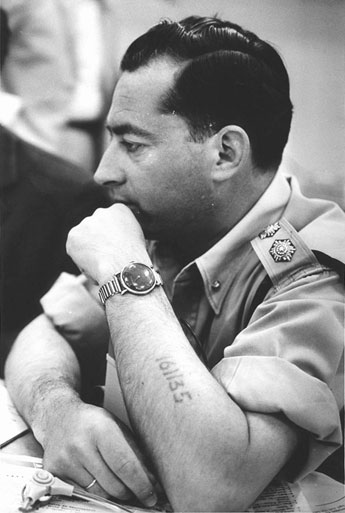He was born in 1925 in Katowice, a Polish city situated at the border with Germany, as Meilach, or Mailakh Goldman. On September 1, 1939, the first day of World War II, he and his family fled to the area of Przemyśl, where relatives of theirs were living. Przemyśl had been annexed by the Soviets; in June 1941, with the beginning of the German attack on the Soviet Union, it was occupied by the German Army. Meilach Goldman, his parents, and siblings were among the inmates of the Przemyśl ghetto, from which, in 1943, he was deported in 1943, first to the labor camp at Szebnie, then to Monowitz (Auschwitz III). On January 17, 1945, when the Red Army was approaching Auschwitz, the Germans began to evacuate the workforce from Monowitz. Goldman succeeded in escaping from the death march and was hidden by local Polish peasants, to whom he presented himself as a non-Jewish Pole named Bronislaw. On January 26, he met the first soldiers of the advancing Soviet army.
After their liberation, most survivors of the Nazi camps were eager to return to their birth place or to join some association of former camp inmates. However, Goldman asked to be enlisted into the Red Army. After a long screening by the counter-espionage organs of the army, in March 1945 he was assigned to the 100th Rifle Division as a machine-gunner. Goldman fought in Czech Silesia and in northern Moravia (Czechoslovakia) in the Red Army's operation to liberate the Czech Lands from German occupation. In April he was wounded in the leg and spent a month in the military hospital in Opava (Troppau), in Czech Silesia.
In his memoirs, he noted the following: "Soviet soldiers appreciated my courage, but did not believe that I was Jewish, despite the fact that I always emphasized my belonging to the Jewish people. Half-seriously, half-in play, they stated that I must be a Pole because 'there are no Jews on the frontlines'. I was different. I did not take part in 'hunting' for girls and did not imbibe gallons of vodka. They called me "an intellectual" but on the personal level they loved me, except for some inveterate antisemites, mainly Ukrainians." 1
In the published part of his wartime and postwar diary, Goldman-Gilad deliberately omitted details of his Red Army service. However, a couple of them should be noted: his rank was never higher than that of private and his sole award was a medal "For Courage." In mid-June 1945, following the Polish-Soviet accord, Meilach Goldman left the Soviet army for the Polish one.
The other members of his of his family perished in the Przemyśl ghetto.
In May 1947, in Italy, Meilach Goldman-Gilad boarded the immigrant ship "Hatikva" bound for the Land of Israel. The ship was seized at sea by the British and forced to change course to Cyprus, where Goldman-Gilad spent a year-and-a-half in a detention camp. Only in January 1949, did Meilach reach the State of Israel, where he served in the Israeli police.
Goldman-Gilad took part in the Eichmann trial, during which he served as personal aide to Gideon Hausner, the Israeli attorney general who headed the prosecution. Goldman-Gilad was present at the execution of Adolf Eichmann in Ramle prison in 1961.
- 1. Michael Goldman-Gilad, Mi be-esh u-mi be-mayim: Mi-yomano shel srid ha-Shoah, Tel-Aviv: Miskal, 2011, p. 15.







